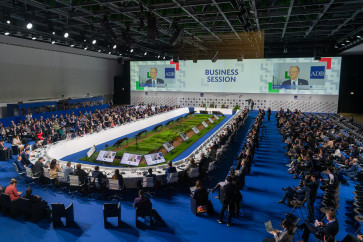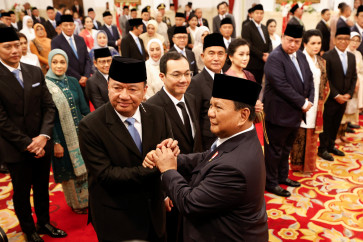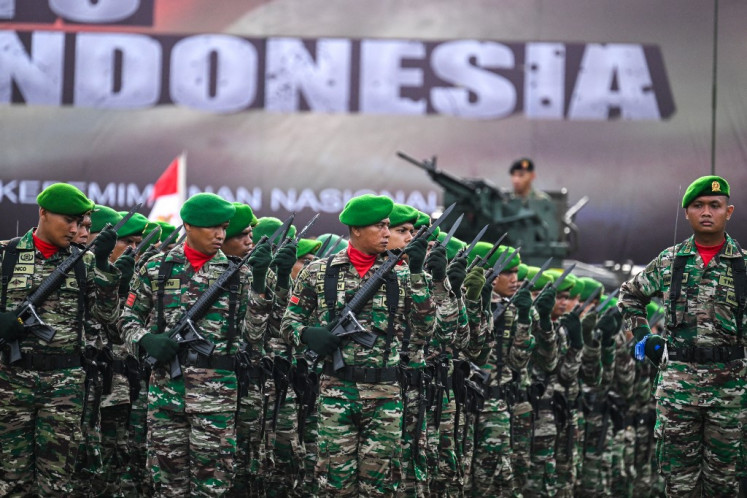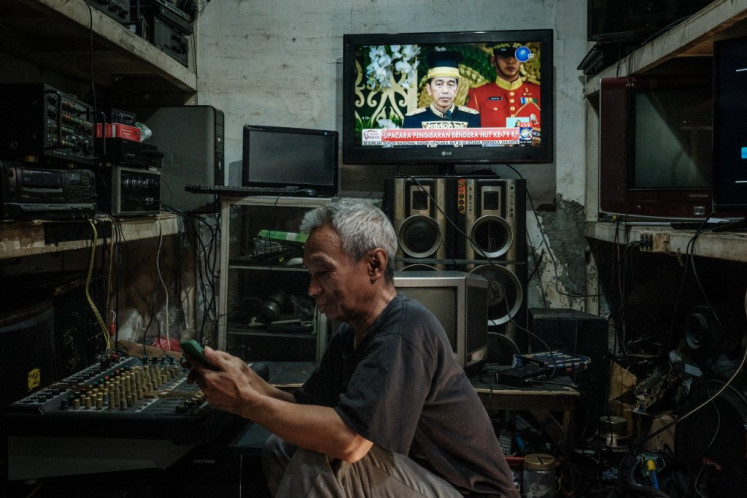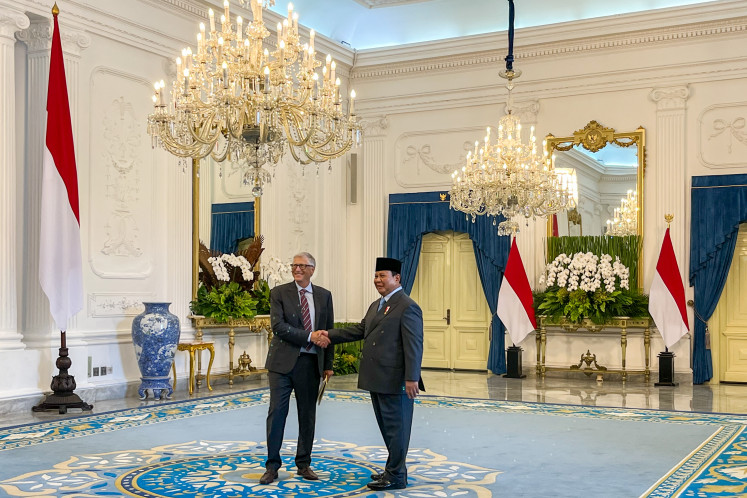Indonesia, South Korea aim to strengthen health cooperation
Indonesia and South Korea are banking on their close cooperation in the health industry, which includes initiatives to develop a COVID-19 vaccine, an immunotherapy drug and diagnostic tools.
Change text size
Gift Premium Articles
to Anyone
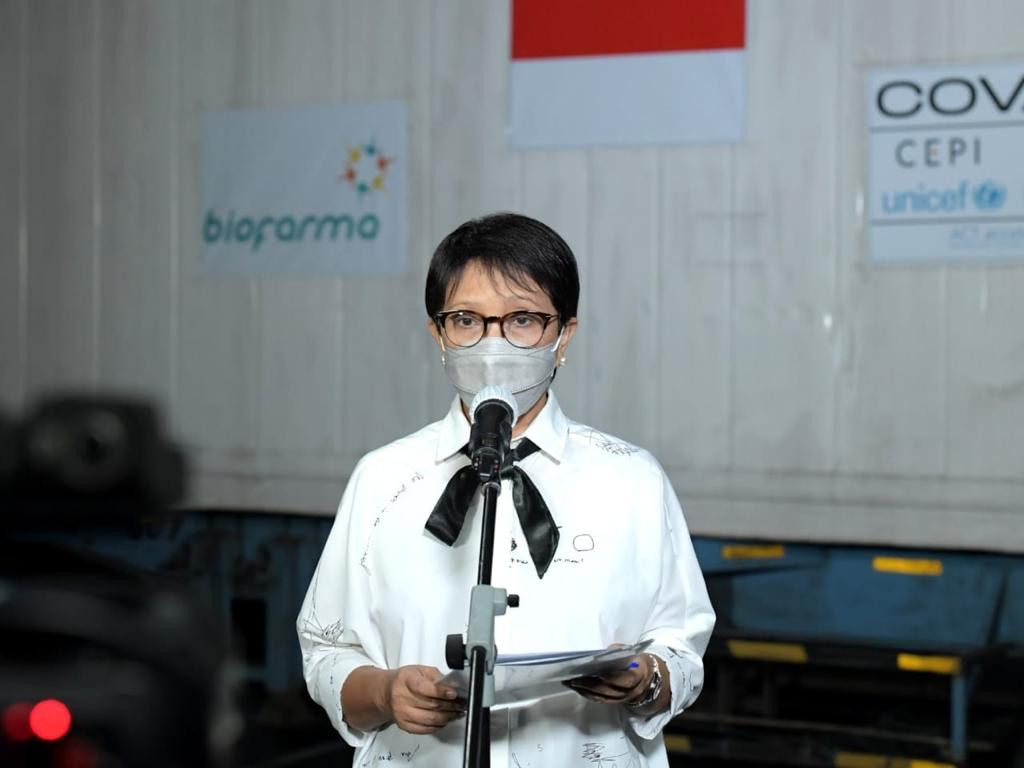
I
ndonesia and South Korea are set to strengthen health cooperation, including by developing vaccines, drugs and diagnostic tools for COVID-19, as the two middle-power countries seek to expand meaningful cooperation.
South Korean Foreign Minister Chung Eui-yong met with Indonesian counterpart Retno Marsudi for a bilateral meeting in Jakarta on Friday, as part of his tour of Southeast Asia this week. He also paid a courtesy call to President Joko “Jokowi” Widodo.
The recently installed top diplomat’s visit is part of South Korea’s wider foreign policy initiative, which was recently updated as the New Southern Policy Plus and aims to deepen engagement with India and Southeast Asia.
The two ministers signed a plan of action for the implementation of their “special strategic partnership”, which was agreed upon when South Korean President Moon Jae-in visited Indonesia in 2017.
Now both sides are looking to capitalize on this close partnership to seek common solutions to the COVID-19 pandemic.
Indonesia’s Retno said South Korea was one of the countries Indonesia enjoyed good health cooperation with amid the pandemic. Both sides are working hand-in-hand on the procurement of personal protective equipment (PPE), diagnostics equipment and medicine.
She said Indonesia welcomed the collaboration between pharmaceutical company Kalbe Farma and South Korea-based Genexine in developing a DNA-based COVID-19 vaccine (GX-19N) that is set to enter phase two and phase three clinical trials in Jakarta and Central Java next month.
“If all the stages are passed [with good results], it is hoped that the vaccine will be available by the end of 2021,” the minister said at the joint press statement on Friday.
The two companies, along with South Korea’s National Institute of Health Research and Development and Daewoong Infion, are also developing a possible immunotherapeutic drug for COVID-19 (GX-17) that is still currently in the testing stage.
Additionally, Indonesian and South Korean firms are also collaborating in the development of COVID-19 diagnostics tools, with Korean diagnostic companies SD Biosensor and Sugentech set to open factories in Indonesia.
The National Development Planning Agency (Bappenas) and the Korean International Cooperation Agency (KOICA) have also recently broached the possibility of launching a US$4 million funding program that aims to support pandemic-prevention initiatives.
“These various collaboration initiatives are certainly expected to strengthen the national health industry and increase our preparedness in facing the threat of pandemics in the future,” Retno said.
Meanwhile, Minister Chung reiterated South Korea’s support for Indonesia in pandemic-related endeavors, saying the country was listed as a priority partner for the handling of COVID-19 since the outbreak more than a year ago.
In the first few months of the pandemic, the South Korean government provided humanitarian assistance worth $500,000 in the form of polymerase chain reaction (PCR) test kits and supplies of disinfectant spray.
“This year we will also provide assistance in the form of COVID-19 prevention equipment and medical equipment, as well as [...] increasing Indonesia’s capacity to deal with COVID-19,” the minister said through an interpreter.
Minister Retno also welcomed the positive performance in trade and investment between the two countries in spite of the pandemic, especially as they work toward ratifying the Indonesia-Korea Comprehensive Economic Partnership Agreement (IK-CEPA).
Bilateral trade increased by 15.2 percent in the first quarter of 2020 year-on-year, while South Korean investments that were realized reached $1.84 billion last year, a significant jump from $1.2 billion in 2019, according to official figures.
“A large portion of the new investment was recorded in the electric car industry and its ecosystem. Last month, the groundbreaking of the KCC Glass factory at the Batang [Integrated Industrial Park] was carried out,” she said.
“Meanwhile, the construction of the Hyundai car factory in Deltamas [in Cikarang, West Java] has entered the final phase. And in the future, it is hoped that there will be concrete implementation of the Joint Venture Battery Project [between] LG Energy Solution and Hyundai in Buli [in North Maluku], Konawe [in Southeast Sulawesi] and Karawang [in West Java].”
In addition to health cooperation, the ministers also discussed other topics such as citizen protection.
South Korea is among the top-five overseas locations where Indonesians have contracted COVID-19, with 324 cases reported as of Friday.
Among the other concerns raised is the issue of protection for 33,000 Indonesian workers in South Korea, including nearly 6,000 who work aboard fishing vessels.
“I have asked Minister Chung to continue to improve protection for Indonesian migrant workers, including Indonesian crew members, in South Korea,” Retno said.
The two countries recently signed a memorandum of understanding on employment and labor relations for crew employed on South Korean vessels of over 20 gross tons.


